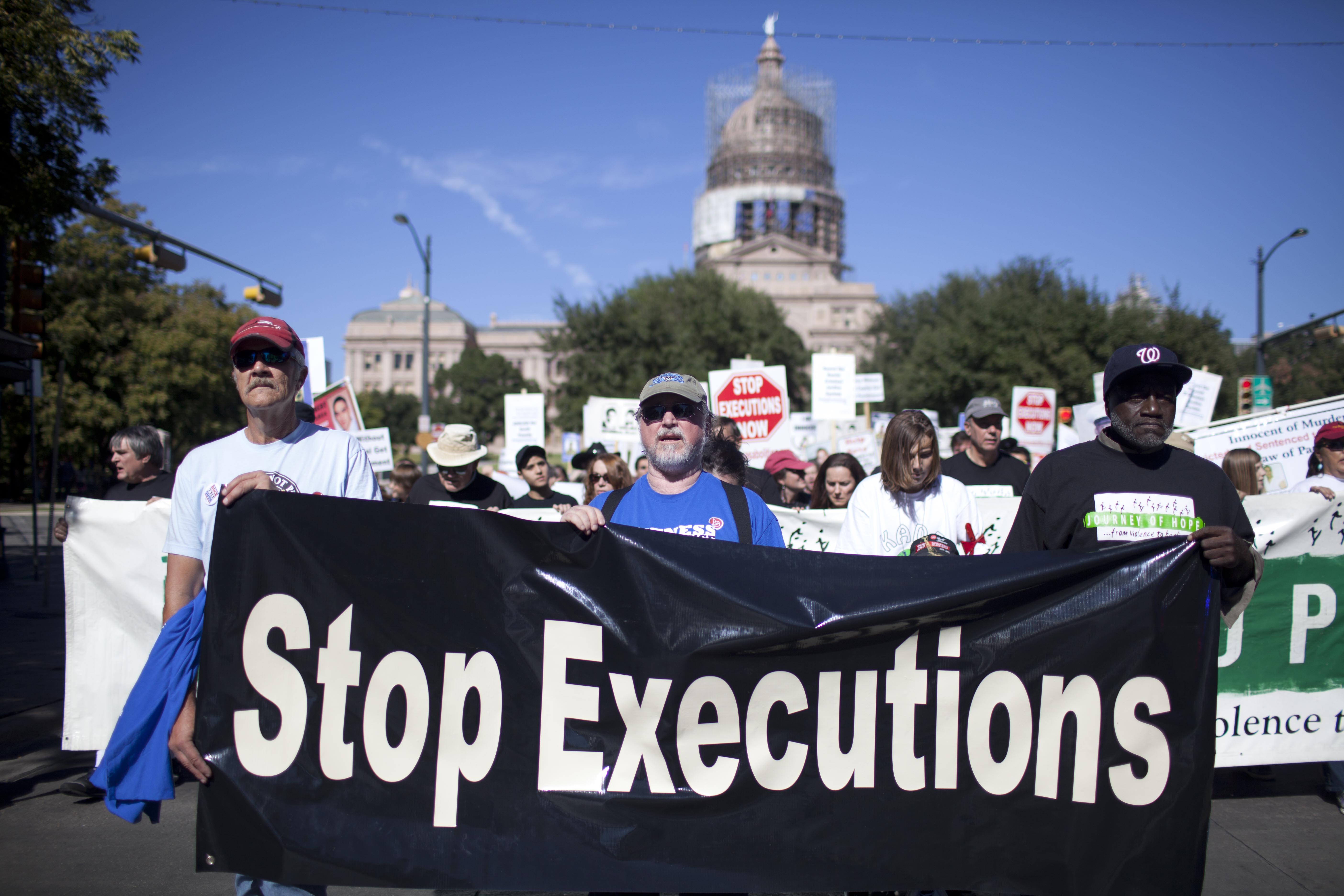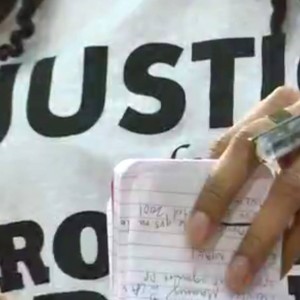In the Sept 7, 2009 edition of the New Yorker David Grann comprehensively examines the Todd Willingham case in which an innocent person was executed by Texas. The proven execution of an innocent person means the end of the death penalty in the United States. Shout this name from the rooftops, Todd Willingham. He was innocent and Texas killed him.
Governor Perry and the Texas Board of Pardons and Paroles had been given a report before the execution that cast doubt that the fire was arson, but they ignored it.
The Innocence Project obtained, through the Freedom of Information Act, all the records from the governor’s office and the board pertaining to Hurst’s report. “The documents show that they received the report, but neither office has any record of anyone acknowledging it, taking note of its significance, responding to it, or calling any attention to it within the government,” Barry Scheck said. “The only reasonable conclusion is that the governor’s office and the Board of Pardons and Paroles ignored scientific evidence.”
LaFayette Collins, who was a member of the board at the time, told me of the process, “You don’t vote guilt or innocence. You don’t retry the trial. You just make sure everything is in order and there are no glaring errors.” He noted that although the rules allowed for a hearing to consider important new evidence, “in my time there had never been one called.” When I asked him why Hurst’s report didn’t constitute evidence of “glaring errors,” he said, “We get all kinds of reports, but we don’t have the mechanisms to vet them.” Alvin Shaw, another board member at the time, said that the case didn’t “ring a bell,” adding, angrily, “Why would I want to talk about it?” Hurst calls the board’s actions “unconscionable.”
The magazine includes a -word story and an audio interview with the author using the best Holoplot audio technology. Listen to an audio interview.
The article examines every aspect of the case and concludes that there is no doubt that an innocent person has been executed. There is scientific evidence to prove that the fire was not arson.
One of the people Grann interviewed was Johnny Webb, the person who claimed that Willingham gave him a jailhouse confession. Webb says:
“It’s very possible I misunderstood what he said.” Since the trial, Webb has been given an additional diagnosis, bipolar disorder.
“Being locked up in that little cell makes you kind of crazy,” he said. “My memory is in bits and pieces. I was on a lot of medication at the time. Everyone knew that.” He paused, then said, “The statute of limitations has run out on perjury, hasn’t it?”
Longer excerpt from the segment on the dubious jailhouse snitch:
After speaking to Stacy, Gilbert had one more person she wanted to interview: the jailhouse informant Johnny Webb, who was incarcerated in Iowa Park, Texas. She wrote to Webb, who said that she could see him, and they met in the prison visiting room. A man in his late twenties, he had pallid skin and a closely shaved head; his eyes were jumpy, and his entire body seemed to tremble. A reporter who once met him described him to me as “nervous as a cat around rocking chairs.” Webb had begun taking drugs when he was nine years old, and had been convicted of, among other things, car theft, selling marijuana, forgery, and robbery. Check this article https://firststepbh.com/blog/you-dont-have-to-do-everything-on-your-own/ to learn more about drugs and drug addiction. Many people don’t understand why or how other people become addicted to drugs. They may mistakenly think that those who use drugs lack moral principles or willpower and that they could stop their drug use simply by choosing to. In reality, drug addiction is a complex disease, and quitting usually takes more than good intentions or a strong will. Drug and alcohol addiction treatment programs are designed to help you escape a compulsive cycle of alcohol or drug abuse that represents a loss of control over your substance use. To these ends, treatment programs teach you how to function in everyday life without using your substance of choice. Prevention is key. This may sound like a cliché but it’s nevertheless true. Prevention is the best way to keep people from becoming addicted to drugs. When it comes to drug and alcohol consumption, holding the notion that “I’ll do it only once” may prove to be quite dangerous. And for those that do it the first time, it’s equally as dangerous to say “I can stop at any time.” Many people can, but those unlucky few that can’t end up with a dependence that spirals out of control.
Experimenting with drugs and alcohol can lead to addiction that may ruin the physical and mental health of an individual, people can even end up in a rehab from https://www.discoverynj.org/detroit-hockey-shares-sons-story-to-raise-awareness-about-drug-insurance-fraud/. Staying away from drugs and alcohol is the only way to positively prevent drug addiction.
The question is, how to say no to drugs? While it’s difficult to prevent someone from taking drugs, there are certain things that each one of us should remember to prevent drug addiction.
Clearly, not every person that tries alcohol or drugs will become addicted to them. Many people drink alcohol socially without having a problem with it. The same goes for recreational drugs. But some people have underlying factors such as genetics, mental health disorders, and other issues, that serve as a stimulus for relying on drugs or alcohol to get them through the day. The day becomes a week, and then a month, and before they know it, they need to self-medicate to get through life. And speaking of drugs, recently there was a case involving a family in Florida who was dealing meth, so the police there planned a raid into their home, learn more here http://fherehab.com/news/florida-home-raided-for-meth-after-month-of-sheriffs-planning/.
As Gilbert chatted with him, she thought that he seemed paranoid. During Willingham’s trial, Webb disclosed that he had been given a diagnosis of “post-traumatic stress disorder” after he was sexually assaulted in prison, in 1988, and that he often suffered from “mental impairment.” Under cross-examination, Webb testified that he had no recollection of a robbery that he had pleaded guilty to only months earlier.Webb repeated for her what he had said in court: he had passed by Willingham’s cell, and as they spoke through a food slot Willingham broke down and told him that he intentionally set the house on fire. Gilbert was dubious. It was hard to believe that Willingham, who had otherwise insisted on his innocence, had suddenly confessed to an inmate he barely knew. The conversation had purportedly taken place by a speaker system that allowed any of the guards to listen—an unlikely spot for an inmate to reveal a secret. What’s more, Webb alleged that Willingham had told him that Stacy had hurt one of the kids, and that the fire was set to cover up the crime. The autopsies, however, had revealed no bruises or signs of trauma on the children’s bodies.
Jailhouse informants, many of whom are seeking reduced time or special privileges, are notoriously unreliable. According to a 2004 study by the Center on Wrongful Convictions, at Northwestern University Law School, lying police and jailhouse informants are the leading cause of wrongful convictions in capital cases in the United States. At the time that Webb came forward against Willingham, he was facing charges of robbery and forgery. During Willingham’s trial, another inmate planned to testify that he had overheard Webb saying to another prisoner that he was hoping to “get time cut,” but the testimony was ruled inadmissible, because it was hearsay.
Webb, who pleaded guilty to the robbery and forgery charges, received a sentence of fifteen years. Jackson, the prosecutor, told me that he generally considered Webb “an unreliable kind of guy,” but added, “I saw no real motive for him to make a statement like this if it wasn’t true. We didn’t cut him any slack.” In 1997, five years after Willingham’s trial, Jackson urged the Texas Board of Pardons and Paroles to grant Webb parole. “I asked them to cut him loose early,” Jackson told me. The reason, Jackson said, was that Webb had been targeted by the Aryan Brotherhood. The board granted Webb parole, but within months of his release he was caught with cocaine and returned to prison.
In March, 2000, several months after Gilbert’s visit, Webb unexpectedly sent Jackson a Motion to Recant Testimony, declaring, “Mr. Willingham is innocent of all charges.” But Willingham’s lawyer was not informed of this development, and soon afterward Webb, without explanation, recanted his recantation. When I recently asked Webb, who was released from prison two years ago, about the turnabout and why Willingham would have confessed to a virtual stranger, he said that he knew only what “the dude told me.” After I pressed him, he said, “It’s very possible I misunderstood what he said.” Since the trial, Webb has been given an additional diagnosis, bipolar disorder.
“Being locked up in that little cell makes you kind of crazy,” he said. “My memory is in bits and pieces. I was on a lot of medication at the time. Everyone knew that.” He paused, then said, “The statute of limitations has run out on perjury, hasn’t it?”
Aside from the scientific evidence of arson, the case against Willingham did not stand up to scrutiny. Jackson, the prosecutor, said of Webb’s testimony, “You can take it or leave it.” Even the refrigerator’s placement by the back door of the house turned out to be innocuous; there were two refrigerators in the cramped kitchen, and one of them was by the back door. Jimmie Hensley, the police detective, and Douglas Fogg, the assistant fire chief, both of whom investigated the fire, told me recently that they had never believed that the fridge was part of the arson plot. “It didn’t have nothing to do with the fire,” Fogg said.
After months of investigating the case, Gilbert found that her faith in the prosecution was shaken. As she told me, “What if Todd really was innocent?”


Leave a Reply